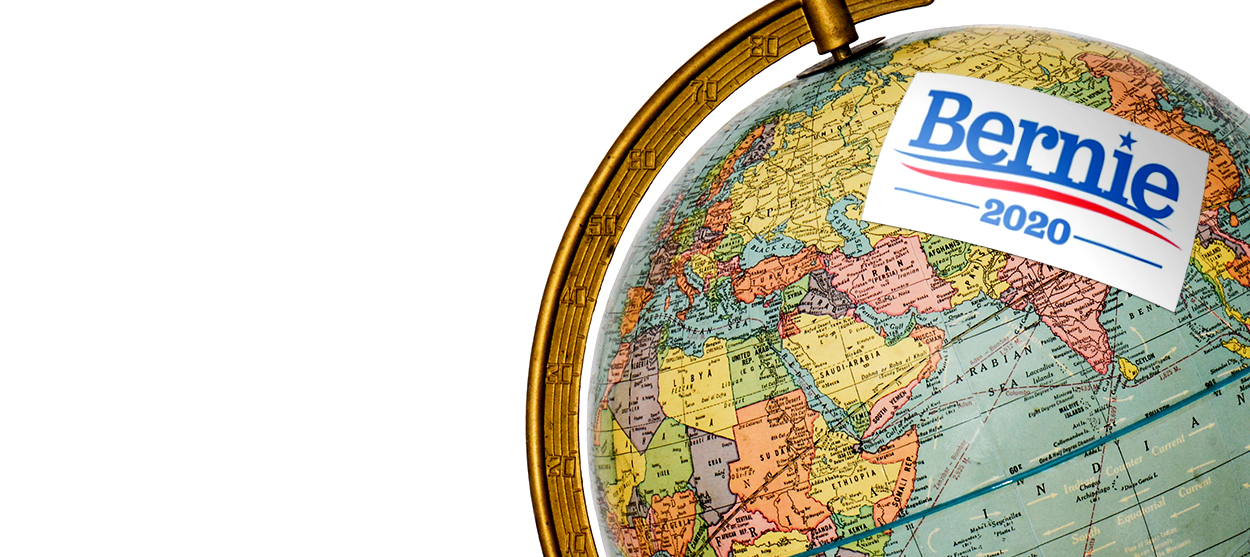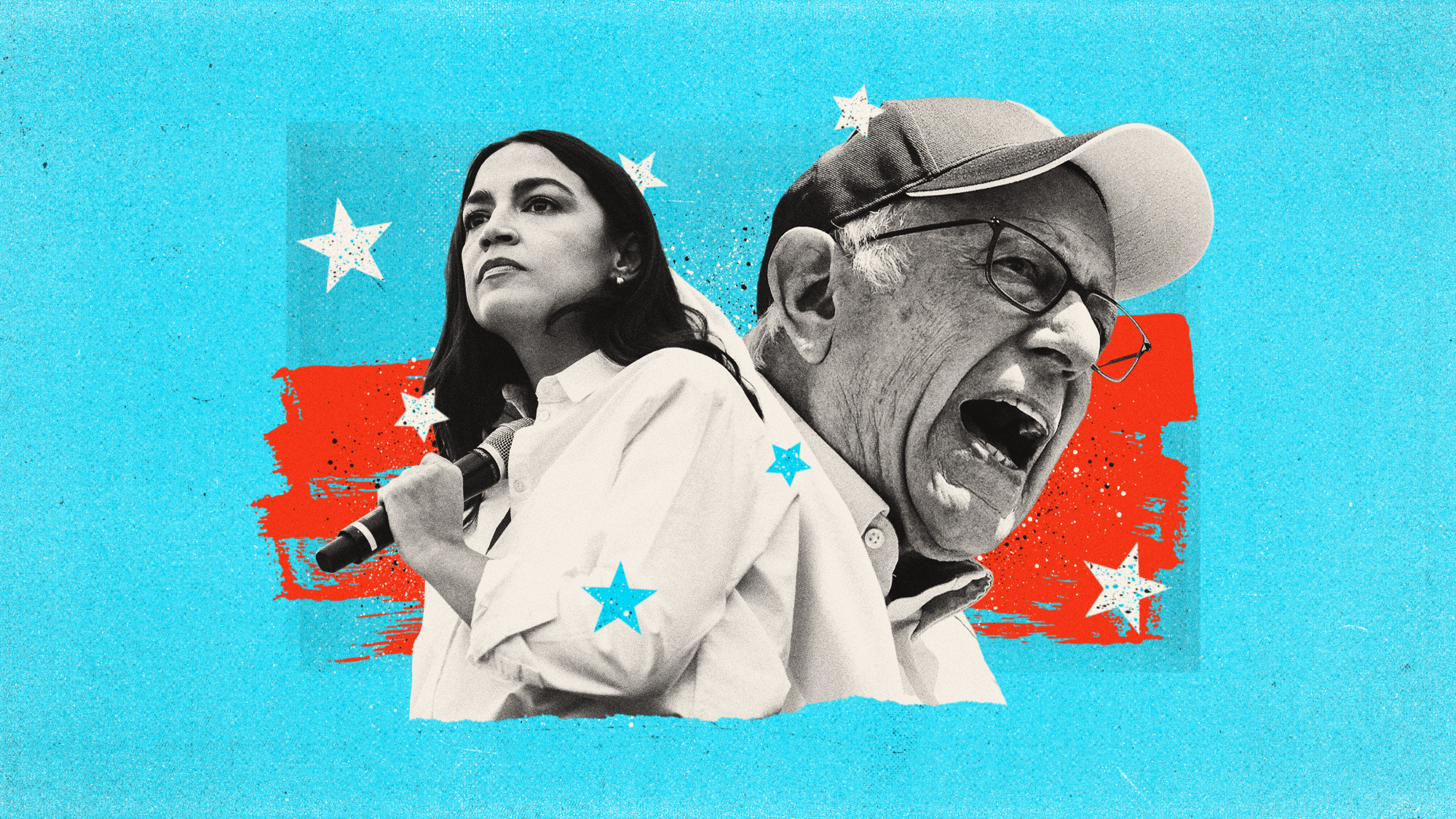Bernie Sanders is America's best hope for a sane foreign policy
He's running to end American imperialism — and unlike Trump, he means it


A free daily email with the biggest news stories of the day – and the best features from TheWeek.com
You are now subscribed
Your newsletter sign-up was successful
In the American foreign policy discussion, socialists are often presented as gormless naifs — people whose utopian projects might sound good in theory, but who can't be trusted to exercise real power in a dangerous world. Only hard-nosed liberals or conservatives can make the tough decisions required to protect American interests.
Yet it is beyond question that, for at least the last 20 years now, American foreign policy has indeed been in the grips of starry-eyed utopian cranks — the imperialist variety, whose violent madcap schemes have unleashed hell across the globe, for no purpose or benefit to anyone but a narrow elite. Most recently, the supposedly anti-war President Trump has assassinated Iran's most important military leader under the delusional belief that it will somehow reduce instability and violence in the region.
Meanwhile, the 2020 presidential candidate with the most serious, realistic foreign policy agenda is the self-identified socialist, Bernie Sanders. Sanders promises the most stubborn confrontation with this lunatic militarism on offer, and the best possibility that America might become a responsible member of the international community.
The Week
Escape your echo chamber. Get the facts behind the news, plus analysis from multiple perspectives.

Sign up for The Week's Free Newsletters
From our morning news briefing to a weekly Good News Newsletter, get the best of The Week delivered directly to your inbox.
From our morning news briefing to a weekly Good News Newsletter, get the best of The Week delivered directly to your inbox.
Let's briefly review American foreign policy since the turn of the millennium. After the 9/11 attacks, President Bush launched an invasion of Afghanistan to topple the Taliban and destroy Al Qaeda. This quickly became a quagmire of an occupation, with clueless U.S. forces halfheartedly trying to stand up a democracy in the graveyard of empires.
Then, as had been the plan all along, Bush launched a wholly illegal war of aggression against Iraq, justified by faked-up intelligence about weapons of mass destruction and heavy implications that Saddam Hussein had been behind 9/11. Neither was true, and while Hussein was defeated easily, another quagmire quickly developed — drastically worsened by the bungling idiots Bush put in charge of things, who dismissed the entire Iraqi army and forced destructive right-wing economic policy on the fledgling Iraqi state.
Meanwhile, occupation forces committed scores of atrocities in both countries — some the typical concomitants of war, some simply gratuitous crimes, as in the torture dungeon at Abu Ghraib and the Nisour Square massacre. Bush himself and all his top advisers set up a program of systematic illegal torture which produced no good intelligence and made it impossible to prosecute some of the perpetrators of 9/11.
Across the world, the U.S. was revealed as a shrieking, blood-drenched hypocrite — a nation that loudly proclaimed itself to be a paragon of freedom and democracy while contemptuously ignoring international law and committing horrifying war crimes by the score.
A free daily email with the biggest news stories of the day – and the best features from TheWeek.com
The decisive factor in Barack Obama's victory over Hillary Clinton in the 2008 Democratic presidential primary was the fact that he had opposed the Iraq invasion while she had voted for it. But once in power, Obama appointed Clinton as secretary of state and largely embraced Bush's imperialist foreign policy. He slowly drew down forces in Iraq, but drastically escalated the war in Afghanistan, which accomplished nothing except more chaos and death. As the Afghanistan Papers recently published by the Washington Post reveal, Obama administration military commanders and officials lied constantly about the total lack of progress on any of the occupation's goals.
Obama also sharply escalated the use of drone attacks, killing thousands of people in several countries — including several U.S. citizens, one of them a 16-year-old boy. He largely backed the Saudi war in Yemen, which quickly turned into a humanitarian catastrophe. And while Obama banned torture by executive order, he refused to prosecute any of the perpetrators (as required by treaty) and quietly backed the CIA in its effort to suppress the Senate report on its torture program — which included illegal spying on Senate staffers.
The post-9/11 wars have already cost roughly $6.4 trillion (in current and future costs). Now President Trump has escalated U.S. troop deployments across the world, and further scaled up the use of drone attacks — culminating with the assassination of Iranian general Qassam Soleimani in Baghdad last week, raising the prospect of an all-out war with Iran.
Bernie Sanders has stood against the worst of all this. He opposed the Iraq invasion because of probable U.S. casualties, the terrible precedent it would set, the heavy cost, and possible blowback. He voted against Michael Mukasey to become attorney general in 2007 because he refused to say whether waterboarding was torture and refused to recognize any limits on the president's wartime authority. He opposed Obama's surge in Afghanistan. And he has loudly condemned practically every action of President Trump of any kind.
Now, foreign policy was clearly not Sanders' main concern during most of his time in Congress, and he has not been as strong a critic of imperialism as some people. He did, like everyone in Congress except Rep. Barbara Lee (D-Calif.), vote for the Afghanistan invasion. In 2011, he was mealy-mouthed on the assassination of U.S. citizen Anwar al-Awlaki.
But since foreign policy was identified as a weakness in his 2016 campaign, he has scaled up his policy work and staffing there, especially by hiring Matt Duss, a noted anti-war scholar. Sanders has bolstered his anti-war thinking and messaging, including both extensive speeches and contemptuous attacks on well-connected imperialists like Henry Kissinger. Sanders now says his Afghanistan vote was a mistake and favors a careful withdrawal of troops there.
In the 2020 campaign, Sanders has leaned into the anti-war message, distinguishing himself as the boldest critic of imperial overreach in the Democratic field. As Ryan Brooks writes at Buzzfeed News, Sanders was alone among the Democratic frontrunners in not implicitly justifying the assassination of Soleimani in his initial response. Even Elizabeth Warren couldn't manage this, though she did come out with a better response after her first one drew criticism from the left. (Joe Biden didn't even explain why the Obama administration didn't kill Soleimani, while Mike Bloomberg supported it outright.)
Make no mistake, any president attempting to even scale back the rate of atrocities committed by American military forces is going to face stiff resistance in Congress and especially from the complex of military contractors who have gotten hog-rich on ever-more bloated defense budgets — often by basically defrauding the government. But that is another mark in Sanders' favor. Only the most stubborn and committed anti-war president has a chance of putting U.S. foreign policy on an even slightly sane footing. At a minimum, Sanders is the candidate least likely to start a new war for no reason — no small thing!
Sanders could also possibly draw on deep wells of support for imperial rollback. Several studies and polls exploring the citizenry's opinion on foreign affairs have found a sort of bewildered irritation at the giant waste of resources all these wars have been. A recent poll asking what the U.S. should do regarding Iran found people against war by a 76-21 margin. A Center for American Progress focus group study described voters wanting "their political leaders to make more public investments in the American people in order to compete in the world and to strike the right balance abroad after more than a decade of what they see as military overextension." Veterans and ordinary people alike agree by huge margins that both the wars in Iraq and Afghanistan were a mistake.
In other words, most Americans are disturbed by the epic, endless scale of military spending, and would like a goodly portion of that to be redirected back into the country itself. Yet, it's a fairly quiet opinion, likely in part because only a tiny proportion of the citizenry actually serves in the military, and because almost all Washington foreign policy discussion is dominated by a knee-jerk imperialist mindset. The so-called Foundation for Defense of Democracies, a neoconservative think tank heavily funded by right-wing billionaires that has lobbied incessantly against the Iran nuclear deal and for regime change in that country, was cited at least four times in the New York Times' initial coverage of the Soleimani assassination. In the rest of the mainstream media, blind troop worship is typically the norm.
However, we can also see that warmongers of the D.C. "Blob" have not convinced the broader American public. Instead, they have prevented anyone from trying to activate voters using the (correct) argument that they are being fleeced by a corrupt military establishment. Many might be swayed to vote or pressure their members of Congress if they were presented with such an argument — which is exactly what Sanders plans to do.
The last 20 years of American foreign policy have seen bloody bungling on a scale of Napoleon's invasion of Russia. A sensible, realistic approach would start by not doing that anymore. Bernie Sanders is the best choice to bring America back to its foreign policy senses.
Want more essential commentary and analysis like this delivered straight to your inbox? Sign up for The Week's "Today's best articles" newsletter here.
Ryan Cooper is a national correspondent at TheWeek.com. His work has appeared in the Washington Monthly, The New Republic, and the Washington Post.
-
 How the FCC’s ‘equal time’ rule works
How the FCC’s ‘equal time’ rule worksIn the Spotlight The law is at the heart of the Colbert-CBS conflict
-
 What is the endgame in the DHS shutdown?
What is the endgame in the DHS shutdown?Today’s Big Question Democrats want to rein in ICE’s immigration crackdown
-
 ‘Poor time management isn’t just an inconvenience’
‘Poor time management isn’t just an inconvenience’Instant Opinion Opinion, comment and editorials of the day
-
 The billionaires’ wealth tax: a catastrophe for California?
The billionaires’ wealth tax: a catastrophe for California?Talking Point Peter Thiel and Larry Page preparing to change state residency
-
 Mamdani vows big changes as New York’s new mayor
Mamdani vows big changes as New York’s new mayorSpeed Read
-
 Bari Weiss’ ‘60 Minutes’ scandal is about more than one report
Bari Weiss’ ‘60 Minutes’ scandal is about more than one reportIN THE SPOTLIGHT By blocking an approved segment on a controversial prison holding US deportees in El Salvador, the editor-in-chief of CBS News has become the main story
-
 Has Zohran Mamdani shown the Democrats how to win again?
Has Zohran Mamdani shown the Democrats how to win again?Today’s Big Question New York City mayoral election touted as victory for left-wing populists but moderate centrist wins elsewhere present more complex path for Democratic Party
-
 Millions turn out for anti-Trump ‘No Kings’ rallies
Millions turn out for anti-Trump ‘No Kings’ ralliesSpeed Read An estimated 7 million people participated, 2 million more than at the first ‘No Kings’ protest in June
-
 Ghislaine Maxwell: angling for a Trump pardon
Ghislaine Maxwell: angling for a Trump pardonTalking Point Convicted sex trafficker's testimony could shed new light on president's links to Jeffrey Epstein
-
 The last words and final moments of 40 presidents
The last words and final moments of 40 presidentsThe Explainer Some are eloquent quotes worthy of the holders of the highest office in the nation, and others... aren't
-
 The anger fueling the Bernie Sanders and Alexandria Ocasio-Cortez barnstorming tour
The anger fueling the Bernie Sanders and Alexandria Ocasio-Cortez barnstorming tourTalking Points The duo is drawing big anti-Trump crowds in red states
